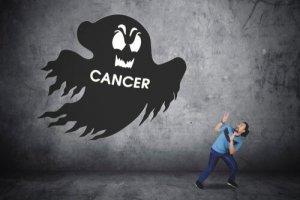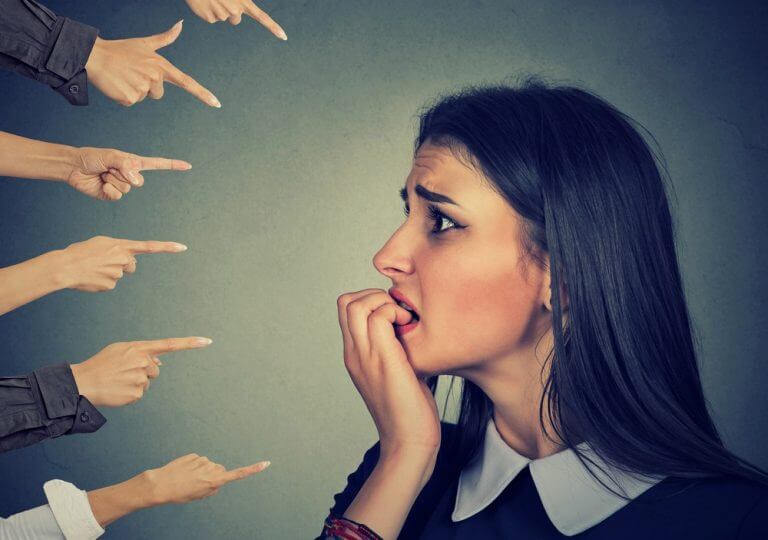Carcinophobia, or the Fear of Cancer

It’s normal to have a fear of cancer. After all, it’s a serious disease that can be unpredictable. Usually, you need serious treatments to cope with it. Nearly everyone is afraid of illnesses and death to some degree.
However, this fear becomes a problem when it starts to be irrational and obsessive. In that case, it’s a phobia. Therefore, it leads to taking unnecessary precautions that might even be counterproductive.
The exaggerated fear of suffering cancer also leads to unnecessary emotional suffering. You may start to see any symptom as a possible sign of cancer, and any circumstance may feel like a threat. However, this damages both your physical and mental health.
Carcinophobia: An excessive fear of cancer

Likewise, when there’s too much fear and it becomes a phobia, it affects your everyday life. You might avoid the sun because it can lead to melanoma. On the other hand, you might not eat certain foods because there are rumors that they cause cancer.
Carcinophobia constantly makes you anxious because you see risks where there are none. In fact, it’s very similar to what happens with hypochondria. People with this condition think any symptom is the end of the world, even if there isn’t a reason for it.
Also read: Help an Older Adult Cope with a Disease
The path of avoidance
One of the paths people with carcinophobia take is the path of avoidance. In other words, they avoid anything they think might cause cancer. It’s a flight behavior.
Overall, there are two types of avoidance:
- In the first type, they become excessively preventative. They are extra careful with their diet, using cell phones, etc. In fact, they may even think having contact with cancer patients might give them cancer, too.
- For the second type, because of the fear of cancer, they avoid going to the doctor at all costs. Sometimes, they feel certain that they have the disease, but are afraid that the doctor will confirm their self-diagnosis. They prefer to keep living with doubt and anxiety.
The obsessive fear of cancer

Another common thing among people with carcinophobia is obsessive fear. In fact, you could say this is the opposite of avoidance. Instead of changing or distracting themselves from the subject, they obsess over learning everything they can about it.
Also, any time their body hurts or feels uncomfortable, they desperately go to the doctor. This is because they’re afraid any symptom is a cancer warning. However, they end up misinterpreting what they hear. If they go to the doctor and s/he doesn’t find cancer, they think the professional is wrong. Then, they go to a new doctor or even refuse medicine in general.
These people are constantly afraid, and going to the doctor makes it worse instead of better.
You might be interested in: 7 Fruits and Vegetables that May Help Reduce Cancer Risk
Myths and facts about cancer
You have to keep in mind that from the minute you’re born, you start to die. Sooner or later, we will all die for one reason or another. This isn’t easy for anyone to deal with, but it gets easier when we accept that it’s a fact.
Nowadays, cancer rates have increased worldwide. However, many people think this might be true because doctors can diagnose cancer earlier than before. Probably, diagnosing the disease has gotten better, which doesn’t mean the disease itself has increased.
Both cancer and other diseases can be prevented to some extent. However, it’s impossible to prevent them completely. In most cases, there are many different causes, and we can’t control them all. A healthy lifestyle, physically and mentally, helps a lot to prevent illnesses.
If you think you have carcinophobia, consult a psychologist.
All cited sources were thoroughly reviewed by our team to ensure their quality, reliability, currency, and validity. The bibliography of this article was considered reliable and of academic or scientific accuracy.
- del Pino, M. M. (2014). Algunas reflexiones sobre el tabú a la palabra cáncer. Archivo Médico Camagüey, 10(5).
-
García, R. F. (2000). Aplicación de la terapia de aceptación y compromiso en un ejemplo de evitación experiencial. Psicothema, 12(3), 445-450.
-
Reich, M., Gaudron, C., & Penel, N. (2009). When cancerophobia and denial lead to death. Palliative & Supportive Care, 7(2), 253-255.
This text is provided for informational purposes only and does not replace consultation with a professional. If in doubt, consult your specialist.








